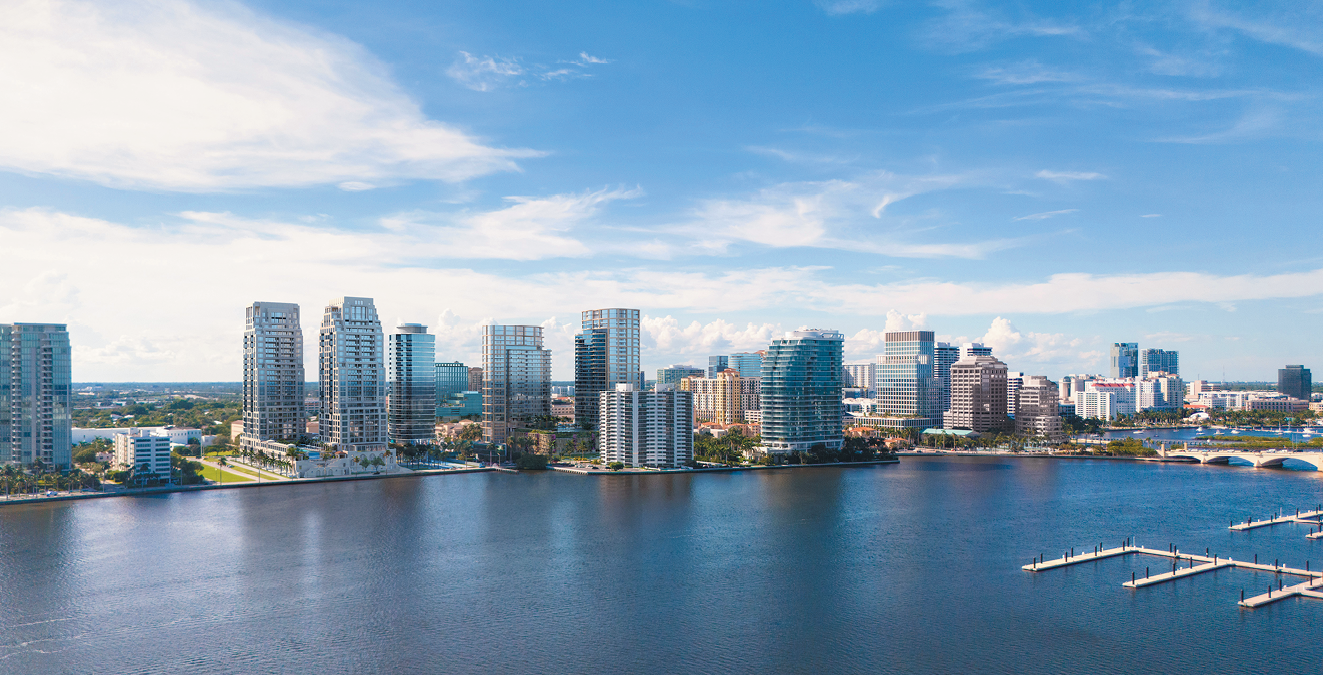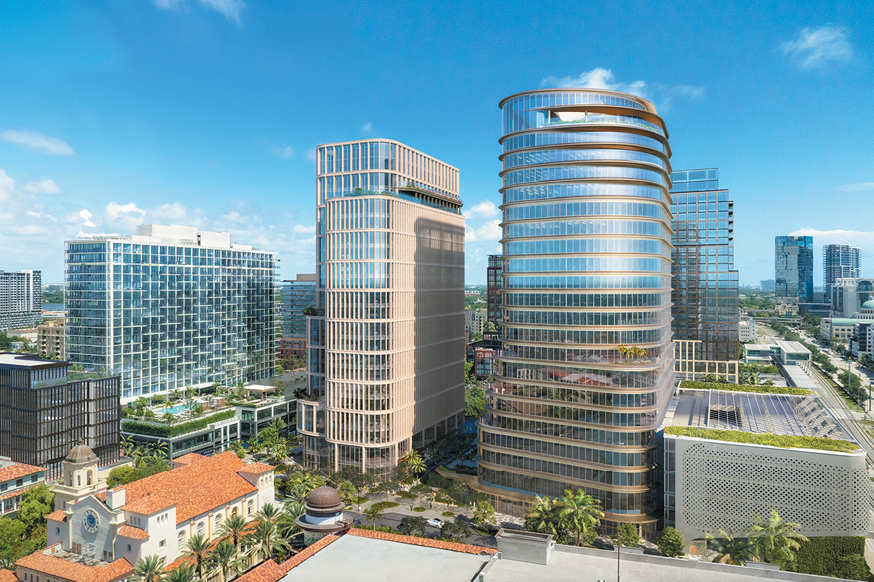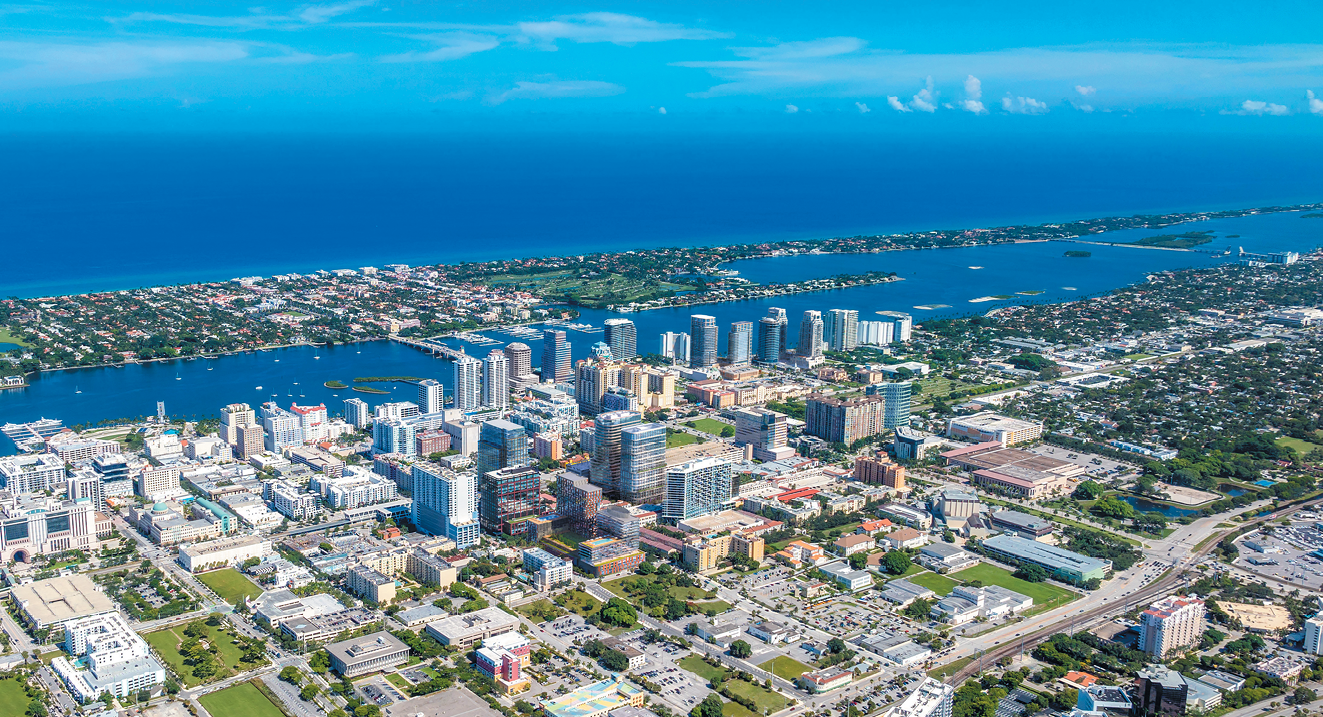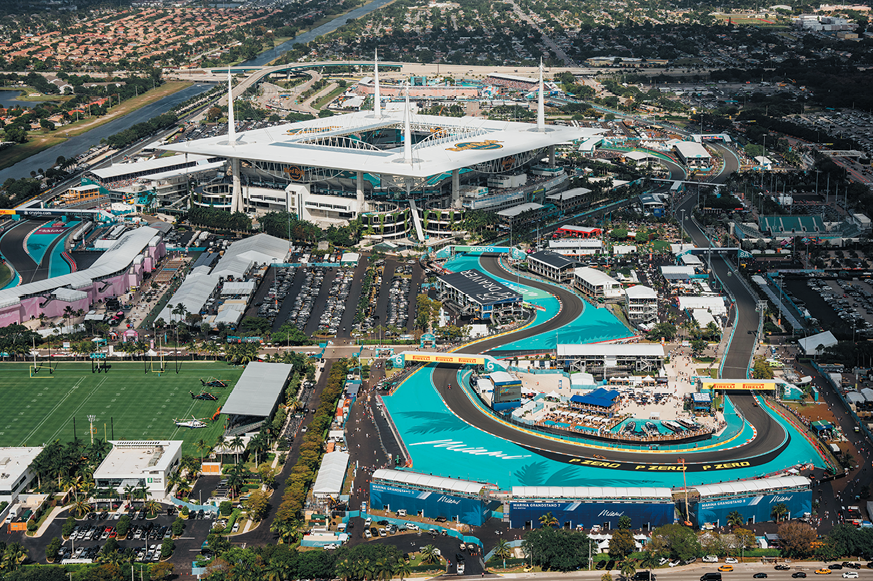- Home
- Media Kit
- MediaJet
- Current Issue
- Past Issues
- Ad Specs-Submission
- Reprints (PDF)
- Photo Specifications (PDF)
- Contact Us
- PRIVACY POLICY
- TERMS OF USE
![]()
ONLINE
![]()
ONLINE

Pushing Boundaries
Editors’ Note
Stephen Ross is the CEO and Chairman of Related Ross, Founder and Non-Executive Chairman of Related Companies, Owner of the Miami Dolphins, and a devoted philanthropist. Ross formed Related Companies in 1972 and today the company has over $60 billion in real estate assets owned or under development including mixed-use, residential, retail, and office properties in premier high-barrier-to-entry markets. In 2024, Ross founded and became Chief Executive of Related Ross, already the largest commercial-property owner in downtown West Palm Beach focused on continued development and inclusive economic growth across South Florida. Ross is an investor in Equinox Fitness Clubs, Equinox Hotels, and SoulCycle. Ross is the owner of the Miami Dolphins, an NFL franchise that has become one of the most fan-friendly in sports under his leadership. He is Chairman and Owner of the Formula 1 Crypto.com Miami Grand Prix. He was instrumental in bringing the Miami Open Tennis Tournament to Hard Rock Stadium. Ross is also Chairman and Co-Founder of RSE Ventures, a multi-national technology, sports, and entertainment venture firm. RSE has invested in and incubated a number of diverse businesses and has also created and launched the International Champions Cup, a global pre-season soccer tournament. Ross has always sought opportunities to give back in meaningful ways. His philanthropic efforts have broadly focused on the areas of education, the arts, racial equality, healthcare, and the creation of more sustainable cities throughout the world. Ross proudly serves on the Executive Committee as a trustee of Lincoln Center, as a trustee of New York-Presbyterian Hospital, and as a director on the boards of Cornell Tech, the Jackie Robinson Foundation, and the New York Stem Cell Foundation. He is a leader and former board member of the World Resources Institute (WRI) where he established the WRI Ross Center for Sustainable Cities, an innovative initiative to integrate urban planning, sustainable transport, energy and climate change, water resources, and governance. Furthermore, he has used his platform to harness the unifying power of sport to advance race relations across the country through the establishment of the nonprofit Ross Initiative in Sports for Equality (RISE). The organization’s efforts have been so impactful that RISE was recognized in 2017 by ESPN’s Humanitarian Awards with the Stuart Scott ENSPIRE Award. Ross is the largest single donor to the University of Michigan supporting the Ross School of Business, critical athletic facilities, scholarships, career development programs, and faculty recruitment and he established the Detroit Center for Innovation. In 2013, Ross pledged to give more than half of his estate to philanthropic causes and charitable organizations through the Giving Pledge, a long-term global initiative created by Warren Buffett and Bill and Melinda Gates that aims to inspire deeper engagement in philanthropy and increase charitable giving globally. Over the years, Ross has received numerous honors for his business, civic, and philanthropic activities. Most recently, he was inducted into the National Football Foundation Leadership Hall of Fame and received the Jackie Robinson Foundation ROBIE Lifetime Achievement Award. He also received the National Building Museum Honor Award and the National Housing Conference’s Housing Person of the Year Award, as well as REBNY’s Harry B. Helmsley Distinguished New Yorker Award, and the Jack D. Weiler Award from UJA. Crain’s New York named Ross one of the 100 Most Influential Leaders in Business, and he was recognized by NYC & Company with their Leadership in Tourism Award. Ross graduated from the University of Michigan with a Bachelor of Business Administration degree, from Wayne State University Law School with a Juris Doctor degree, and from New York University School of Law with a Master of Laws in Taxation. In 2004, the University of Michigan renamed its business school the Stephen M. Ross School of Business at the University of Michigan and in 2011 the University of Michigan awarded Ross an honorary Doctor of Laws degree.
Firm Brief
Related Ross (relatedross.com) is a fully integrated real estate firm with unparalleled expertise in mixed-use development. Related Ross has led the transformation of West Palm Beach into one of the fastest growing cities in the nation to live, work, and visit. It leads the market in Class A office with more than 2.8 million square feet of existing commercial holdings built and under construction. Known for luxury residential buildings, Related Ross is introducing a new class of rentals and condos to the market including The Laurel and South Flagler House. The company also developed and owns the most celebrated destinations in the region including CityPlace – the most visited neighborhood in the city, fostering culture and enriching the community with lush green spaces, a diverse mix of experiential retail and culinary offerings, the largest concentration of public art installed by a private company in Palm Beach County, and educational programming and modern residences; as well as Hilton West Palm Beach, RH West Palm, and the historic Harriet Himmel Theater. The firm is also one of the largest owners and preservationists of affordable housing in the country.

The coast of West Palm Beach
How do you define Related Ross’ mission and purpose?
I started Related Ross to transform West Palm Beach into one of America’s next great cities – on par with innovative areas like Silicon Valley. The goal is to build an environment where the next wave of innovation, especially in technology, can thrive. We want to continue to grow West Palm Beach and South Florida as an area where people genuinely want to live, raise families, grow careers, and enjoy vibrant cultural and recreational experiences. For me, the success of our mission will be measured by how deeply our projects improve people’s lives and enrich the community for generations.
Over the last five years, we’ve done a lot to realize our purpose. We’ve strategically partnered with world-class institutions and invested significantly across West Palm Beach. We’re proud to have attracted prestigious organizations such as Vanderbilt University and Cleveland Clinic, laying the foundation for groundbreaking advancements in education and healthcare. We’ve prioritized enhancing the city’s cultural and recreational offerings, making it a destination for arts, entertainment, and sports. And of course, our bread and butter, real estate. We’ve made substantial infrastructure investments – from sustainable real estate developments, to revitalizing the waterfront and downtown area, all in the effort of transforming West Palm Beach into a dynamic hub that sets the standard for the future of work in Palm Beach County.
What have been the keys to Related Ross’ strength and leadership?
I think the biggest reason Related Ross has grown into the leader it is today is because we’ve never shied away from thinking differently or taking on projects others considered impossible. When Related and I started Hudson Yards, many thought it was simply too complicated and too ambitious to become reality – but we embraced the challenge head-on. This willingness to push boundaries is part of our DNA.
Today, we’re bringing that same bold approach to South Florida. We’ve made major investments into West Palm Beach to create a vibrant urban destination and an economic powerhouse; we’ve brought world-class events like the Miami Open and Formula 1 to Miami Gardens at Hard Rock Stadium in Miami. We continue to redefine what’s possible.
But even more important than these signature projects are the incredible people behind them. You simply can’t achieve great things without talented, passionate, dedicated teams – and we’ve always believed in surrounding ourselves with the best people and genuinely listening to their ideas. It’s that culture and commitment that allows us to keep raising the bar, especially here in West Palm Beach and across South Florida.

10 and 15 CityPlace in West Palm Beach, a LEED Gold
Neighborhood Development certified project
How critical is a commitment to sustainability as part of Related Ross’ culture and values?
Sustainability is a core commitment at Related Ross – not just as a value, but because our industry has a huge opportunity and responsibility to make a difference. When you’re building at the scale we do, there’s enormous potential to positively impact the environment through innovation across every phase of development: design, construction, and operation. We constantly seek out smarter ways to conserve energy, reduce water use, cut waste, and lower emissions. At Hudson Yards, for example, Related built a first-of-its-kind microgrid with two eco-friendly cogeneration plants – something I’m really proud of because it sets a new standard for what’s possible in urban development.
Right here in West Palm Beach, we’re especially proud that CityPlace became just the second LEED Gold Neighborhood Development certified project in all of Florida. That recognition reflects not only our investment in high-performance, resilient infrastructure but also our belief that vibrant, sustainable places benefit everyone – residents, businesses, and the wider community. We’re always pushing to raise the standard, and as we continue to grow in West Palm Beach, we see sustainability as integral to our long-term vision for the city.
Will you highlight Related Ross’ commitment to providing affordable housing?
Affordable housing is where Related began – it’s always been deeply personal to me, and it’s still at the heart of everything we do today, especially here in West Palm Beach. Early on, I saw firsthand how quality, attainable homes could change lives and strengthen entire communities, and that insight has guided us ever since.
Today, as Vice Chair of the Florida Council of 100’s Attainable Housing Committee, I’m working directly with leaders across the state to make sure cities across the state grow in ways that remain inclusive and accessible to everyone. Here in West Palm, we’re actively creating stable housing opportunities that give families and workforces real pathways to success. To me, it’s about ensuring the city we love becomes a model for attainable housing, demonstrating how growth can truly benefit all residents.

An aerial view of West Palm Beach
What is your vision for the future of West Palm Beach and Palm Beach County?
West Palm Beach and Palm Beach County are the most exciting opportunities I have seen in decades. I believed the region had all the ingredients to be the next great American city: location, quality of life, connectivity. But it was missing the kind of intentional investment that turns a good city into a great one. Today, this is the core focus of our development goals for The Gold Coast. It is about building into our culture and community the continuous mentality of industrialization and acceleration. It isn’t about any one industry – we have global financial services institutions in Miami; we have defense and aerospace companies building their future in and around West Palm Beach; and we have a wealth of internationally-recognized universities and local colleges fueling a pipeline of talent into these industries and into the technology sector as well.
These aren’t satellite offices – these are global market leaders making real commitments to the city. And we’ve backed that with developments like 360 Rosemary and One Flagler, which is nearly fully leased before even opening, and additional towers like the new 10 and 15 CityPlace buildings that are setting a new standard for modern office space in Florida.
To build a city, you need more than office buildings. You need talent, healthcare, culture, and education. That’s why we helped bring the Cleveland Clinic to West Palm Beach and supported Vanderbilt’s graduate campus – these institutions attract the kind of people that foster community growth in ways that make cities thrive. Even more fundamentally, you need good roads, frictionless mobility, and innovative public transportation, all of which we’ve made significant investments in.
I want us to make a true impact. In the future, Palm Beach County will be a place where the next generation of entrepreneurs, thinkers, and families come not just to visit, but to stay, build, and grow. That drives everything we’re doing today.
What motivated you to buy the Miami Dolphins, and has being a professional sports team owner been what you expected?
I’ve loved sports my whole life. Growing up, the first section I’d read in the paper was always the sports section. So, when the opportunity to buy the Dolphins came along, I jumped at it. Beyond just football, it gave me the opportunity to have a real impact on a region I care deeply about.
Leading and managing a professional sports franchise has been both engaging and exciting, while it’s also been more challenging than I expected. There is nothing easy about building a winning football team. Winning matters, as much, if not more, in sports than even in business. Our fans deserve that.
On and off the field, I think we’ve built something special. We’ve invested in the stadium, brought in events like Formula 1 Miami Grand Prix, and turned the Dolphins into a year-round engine for the community.
Owning a team, to me, is like running a public trust. You don’t just own a business – you have a responsibility to the fans, the city, and the culture of the sport. I take that seriously. And while I’ll always push to win more games, I’m proud of the broader impact we’ve made in South Florida.

Hard Rock Stadium and the Formula 1 Crypto.com
Miami Grand Prix course in Miami Gardens
You commit your time and resources to a number of philanthropic causes. What has made philanthropy so important to you, and how do you decide where to focus your efforts?
Philanthropy is something I’ve always felt a responsibility to do. When having the success I’ve had – it changes the way you see your role in the world. I’ve signed the Giving Pledge because I believe if you’re in a position to give back, you should. To me, it’s not about charity – it’s about impact.
I tend to focus on causes I care deeply about and where I believe there’s a real opportunity to create change. Climate is one of them – I support the World Resources Institute because the work they’re doing on sustainability is critical for the planet. Education is another. That’s why I’ve supported institutions that open doors for people – whether that’s helping bring Vanderbilt to West Palm Beach or giving back to the University of Michigan, where I’ve been proud to support programs across business, athletics, and urban innovation. Michigan shaped who I am, and I want to ensure future generations have even more opportunities.
At the end of the day, I want to leave more than just buildings behind. I want to invest in people, in progress, in the kind of change that lasts. That’s what philanthropy means to me.
What was your vision for founding the Ross Initiative in Sports for Equality (RISE), and how has the organization evolved?
I’ve always believed in the power of sports to bring people together. Athletes have a voice that cuts through politics and division. So, I started RISE to use that platform – to educate, to spark dialogue, and to push for real change. What started as an idea has grown into a national organization. We’re now in over 40 states, working with leagues, teams, and schools to promote equality and understanding.
We’re not trying to check a box. We’re trying to shift mindsets – especially with young people. Because that’s where long-term change happens. I’m proud of the reach we’ve built, but more importantly, I’m proud of the conversations RISE has helped start. That’s how progress begins.
What do you feel are the keys to effective leadership, and how do you approach your management style?
Leadership starts with vision – being clear about where you’re going and why it matters. But vision alone doesn’t get you far. The real key is surrounding yourself with people who are smarter than you in the areas that count and then giving them the space and trust to do their jobs. I’ve never been afraid to let people lead.
From the beginning of Related forward, I always aimed to build a culture that encourages thinking differently. I don’t want a room full of people who agree with me – I want people who challenge assumptions, who see around corners, who push the envelope. This has been one of the reasons behind our success at Related Ross. We’ve organized an all-star team made up of folks not just with deep expertise in real-estate, but across politics, business, finance, and technology. Leaders like Eric Silagy, Ken Himmel, Webber Hudson, Jordan Bargas, Jordan Rathlev, Bryan Cho, and Katie Block share my vision for Palm Beach County and continue to innovate, challenge the status quo, and push us closer to our mission.
I’m also big on accountability. If you say you’re going to do something, you do it. And if you fall short, you own it and learn. That’s the kind of culture I try to lead – visionary, collaborative, and grounded in trust and performance.
When you look back to 1972 when you founded Related, could you have imagined in the early days that it would become what it is today?
When I started Related, I wasn’t thinking about building the biggest real estate firm in the country. I had just lost my job, and I needed to figure out how to support myself. I borrowed $10,000 from my mother to invest in my next opportunity. That’s how it began – grit and the belief that I could build something better.
What’s happened since then – it’s hard to wrap your head around sometimes. From affordable housing in the Bronx to Hudson Yards in Manhattan to reshaping cities like West Palm Beach, we’ve taken on projects that have changed skylines and, more importantly, impacted communities.
But I didn’t get here alone. We’ve built a company by constantly reinvesting in people, in ideas, in doing things others thought were impossible. I always believed that if you want to do something meaningful, you have to think outside the box and take risks. That mindset hasn’t changed.
With all the success that you have achieved in your career, are you able to enjoy the process and take moments to celebrate the wins?
I’m not someone who spends a lot of time looking in the rearview mirror. I’ve always been focused on what’s next, what needs to be done. But over time, I’ve learned to appreciate the journey more. You have to – especially when you’re pursuing growth at the scale we do. These projects take years, sometimes decades. If you don’t stop to acknowledge the milestones, it all becomes a blur.
I definitely take pride in what we’ve built – seeing a neighborhood come to life, watching a vision on paper turn into something people live and work in every day. That’s incredibly rewarding. And I do celebrate those moments with my team, because none of this happens alone, and those wins belong to everyone who put their heart into it.
That said, I’m still wired to push forward. I think part of enjoying the process is being motivated by what’s possible, not just what’s finished. There’s always something more to build, something to improve – and that keeps me going.
What advice do you offer to young people beginning their careers?
The first thing I’d say is: don’t chase titles – chase learning. Early in your career, it’s not about the paycheck or the job description. It’s about soaking up as much knowledge and experience as you can. Be curious. Ask questions. Take on more than what’s asked of you. That’s how you grow.
Second, don’t be afraid to fail. I got fired before I started Related. At the time, it felt like a setback – but it ended up being the best thing that ever happened to me. Sometimes the worst moments push you to learn more about yourself and explore boundaries.
And most importantly, your reputation is everything. Do what you say you’re going to do. Be someone people can trust and rely on. You build a career – and a life – on that foundation.
If you stay hungry, keep your integrity, and surround yourself with good people, you’ll go further than you think.![]()